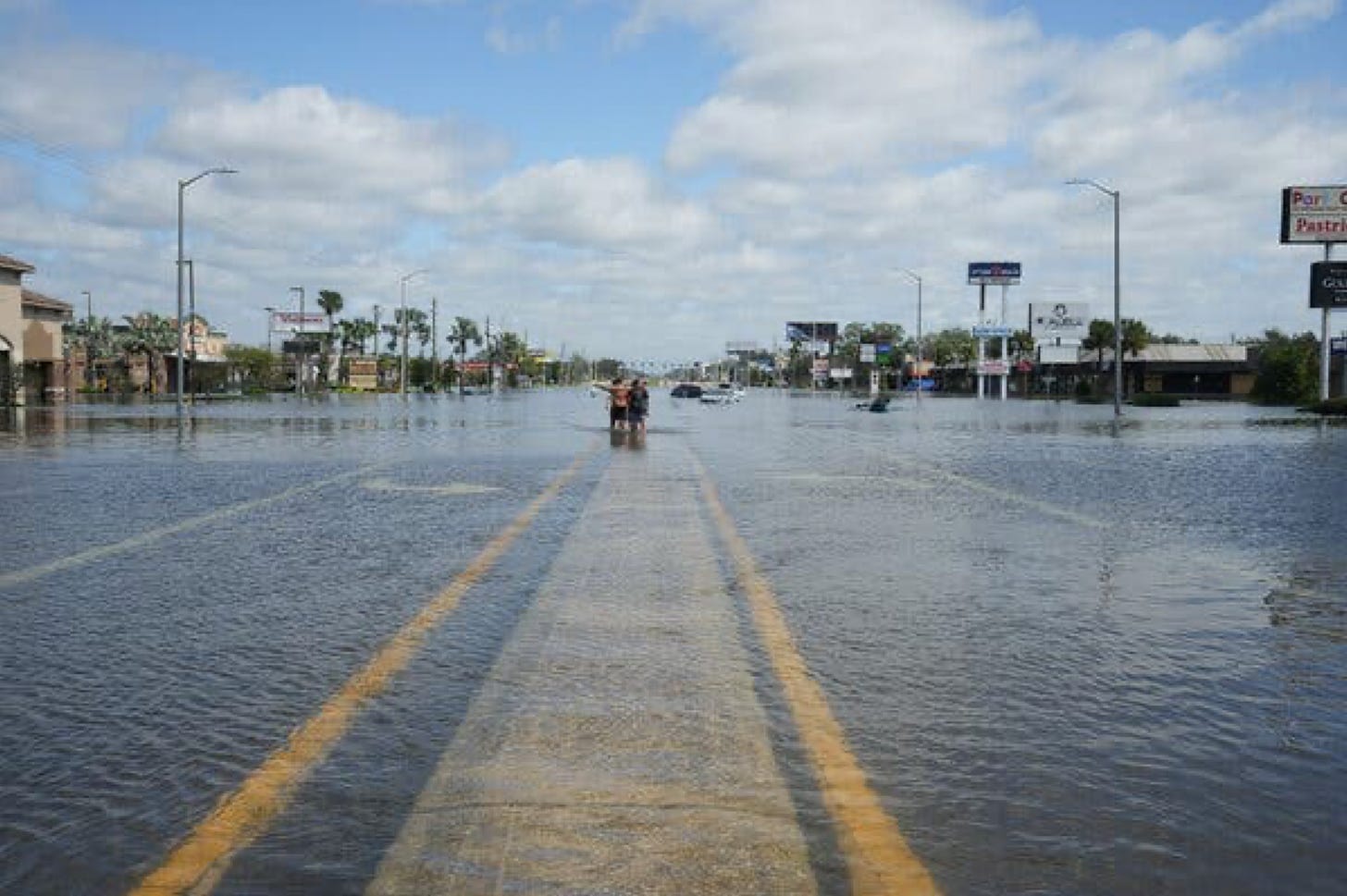I spent most of my life in Green Bay, Wisconsin, cheering on the Packers, frequenting supper clubs and becoming a pro in winter wardrobe layering. I was a Wisconsinite through and through and would have been happy to stay there the rest of my life.
That changed two years ago when I got engaged. My fiancé’s new job took us to Florida — a state I knew little about, including its hurricane season.
We were among the many who moved to the Tampa Bay area, part of the so-called great Florida migration. I had visions of weekend beach trips, during which I’d drape myself in linen neutrals and stroll palm-lined streets. I’d squeeze my own orange juice, learn Spanish and listen to Ricky Martin in the car.
Other than my wearing more linen, none of this has come to pass. Despite my best efforts — which included joining a gym, volunteering, exploring a new career — I didn’t feel connected to Florida. That was before Milton.
Tampa, we had been told, was usually spared from hurricanes, and in my first year in the region, that proved to be true. The city hadn’t taken a direct hit from a major hurricane in more than 100 years. Instagram memes told me Native American burial grounds protected the area. We’d be fine.
As it became clear last week that a hurricane was indeed bearing down on Tampa, I did what prudent Floridians do: I prepped.
At Walmart, people quickly but quietly moved about the aisles, filling their carts. “You know it’s a big one when people here aren’t acting like jerks,” I heard one woman tell another in the canned fruit aisle.
I stood on foot in a line of cars at a propane-filling company along a highway to fill a small tank for our gas grill. After an hour, a man approached and suggested I just go to the front of the line. Those ahead of him beckoned me, too. Store employees filled my tank, sold me another and walked it back to my car.
Our town, Lutz, was not under an evacuation order, and so we decided to stay. I made preparations in anticipation of losing power: froze water bottles, filled bathtubs, charged batteries and moved everything out of the yard that could become a projectile in the wind.
The news channels became Hurricane TV. The headlines were dire. The word “catastrophic” flashed brightly.
When it arrived, Milton looked like a rainstorm and not even a particularly bad one. No thunder or lightning. The news told us that the hurricane had come ashore just south of Tampa. We peered outside, and it didn’t seem to be getting worse. Was it over? Tired from all the prepping, I went to bed.
I awoke suddenly to a loud crash and felt the roof heaving. The power went out, and I heard the wind slapping the roof.
We peeked out the window and saw moss-covered branches leering and blowing at us. We moved everything away from the front windows and hunkered down in our bedroom.
Waking up after Milton hit felt like a grotesque Christmas morning. I jumped out of bed and ran to the window to see what it had brought. I found a gigantic oak against our house. It had cratered the sidewalk and part of our driveway and taken out a section of our roof.
Of all the houses in the neighborhood, our house seemed to suffer the most damage. It was nothing compared with the deadly tornadoes and floods that Milton had caused throughout the state.
Our neighbors immediately came to help. I met people I’d never seen before. One neighbor helped us drag trees off our lawn. Another grilled hot dogs for everyone. Two boys with epic mullets drove by on a golf cart and asked if we wanted a skid steer to remove the trees blocking our road. (I didn’t know what a skid steer was; minutes later they returned with their father and what looked like a small bulldozer.)
A neighbor down the street with a big yellow “Don’t tread on me” flag drove by on a four-wheeler and invited us over for coffee.
“Welcome to Florida,” he said, chuckling. “These hurricanes are the sin tax, the price of living in paradise.”
One man called a tree guy who cut down the oak for a reasonable price. Soon after, a woman in a tie-dyed shirt proclaiming “I am who I am” breezily walked down the middle of the street and stopped and kissed our oak stump. She took a chunk of wood next to the stump, raised it high above her head like a torch and continued down the street.
I smiled at the absurdity of the scene, but I was also grateful for the levity. Throughout the day, there is no discussion of presidential politics. No conversation about climate change. No criticism of the Federal Emergency Management Agency.
Back inside my house, I noticed the sound of generators in the neighborhood, like everyone cutting their grass at the same time. It is a distant, rhythmic hum, and it reminded me that we were all going through something together. Picking up tree limbs. Learning names. Managing without power. For the first time, I felt bonded to the community.
Reconstructing your life in a new place is complex and difficult. It can create a kind of grief that spans the gulf between what you expect your life to be and what it has become.
A hurricane, though, temporarily cures that by putting a pin in your sense of time. There is a before and an after. The weather humbles you and bonds you, even for a bit, to this new place you don’t yet call home.
(The author Katelyn Ferral is a freelance writer who teaches fourth grade at a public school in Tampa, Florida.)



